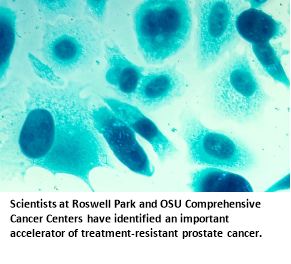Roswell Park/Ohio State Team Identifies Accelerator of Treatment-Resistant Prostate Cancer
Research uncovers a gene that fuels disease progression by rewiring the cancer epigenome
- Loss or mutation of NCOR2 gene accelerates prostate cancer progression
- Gene triggers widespread changes that make androgen therapy less effective
- Finding could lead to novel therapies to overcome treatment resistance
BUFFALO, N.Y. — An international research team co-led by scientists at Roswell Park Comprehensive Cancer Center and The Ohio State University Comprehensive Cancer Center – Arthur G. James Cancer Hospital and Richard J. Solove Research Institute has identified an important accelerator of treatment-resistant prostate cancer. The study, published today in Cell Reports, provides insight into how loss or mutation of the NCOR2 gene accelerates the progression of prostate cancer to a more lethal form of the disease.
 Prostate cancer is the second leading cause of cancer deaths among men, primarily because many patients with aggressive forms of the disease eventually experience progression or recurrence despite treatment. There is a need for new insights into the mechanisms of prostate cancer recurrence, which are multiple and complex, in order to develop new therapeutic targets.
Prostate cancer is the second leading cause of cancer deaths among men, primarily because many patients with aggressive forms of the disease eventually experience progression or recurrence despite treatment. There is a need for new insights into the mechanisms of prostate cancer recurrence, which are multiple and complex, in order to develop new therapeutic targets.
Standard prostate cancer treatment uses drugs that target and block the androgen receptor, a protein that binds to male hormones to drive the development of cancer cells in the prostate. Blocking this driving force is highly effective, at least initially. Unfortunately, the benefits of androgen-deprivation therapy are often short-lived.
“Prostate cancer, even metastatic disease, responds well to androgen deprivation treatment, but tumors almost always recur,” says co-senior author and study leader Dominic Smiraglia, PhD, Associate Professor of Oncology in the Department of Cell Stress Biology at Roswell Park.
To better understand the molecular drivers of treatment resistance, a team of researchers co-led by Dr. Smiraglia and Moray Campbell, PhD, Associate Professor of Pharmaceutics and Pharmacology at The Ohio State University College of Pharmacy and member of the OSUCCC – James Molecular Carcinogenesis and Chemoprevention Research Program, set out to examine the role of NCOR2 (which stands for nuclear receptor corepressor 2/silencing mediator for retinoid and thyroid hormone receptors), a gene that is is mutated in some prostate cancers, in the development and progression of treatment-resistant cancer.
“A role for NCOR2 in prostate cancer has been proposed for a long time, and the current study is the first to ask where it binds in the genome, what genes it regulates and how this impacts the effectiveness of androgen deprivation therapy,” says Dr. Campbell.
Analyzing clinical samples from 707 men with primary, nonmetastatic prostate cancer, the researchers found that reduced expression of NCOR2 was significantly associated with increased levels of serum prostate-specific antigen (PSA), an indicator of prostate cancer progression. A subset of 136 men received androgen-deprivation therapy, and among these men, those with higher levels of NCOR2 were significantly less likely to experience a rise in PSA levels than men with low expression of this gene.
The scientists then reduced NCOR2 expression in a preclinical laboratory model of prostate cancer and found that disease recurrence after androgen-deprivation therapy was accelerated. Genetic and epigenetic changes traditionally associated with cancer were also observed, including increased DNA hypermethylation, suggesting that this gene rewires the epigenome to make prostate cancer cells more resistant to androgen therapy.
“In all of our analyses, we found that loss of NCOR2 not only accelerated prostate cancer recurrence but also induced a shift in cellular identity to neuroendocrine prostate cancer, which is a more lethal form of the disease,” says Dr. Smiraglia.
The faster time to recurrence upon loss of NCOR2 suggests that a reduction in this protein could make some cells resistant to the effects of androgen depletion and opens a new avenue for specific treatments targeting this molecule.
Co-first authors of the study, “Reduced NCOR2 expression accelerates androgen deprivation therapy failure in prostate cancer, are Mark Long, PhD, an Assistant Professor of Oncology in Biostatistics & Bioinformatics at Roswell Park, and Justine Jacobi, a predoctoral trainee in Dr. Smiraglia’s lab.
This study was funded by the U.S. Department of Defense (grant W81XWH-14-1-0608, Program of the Congressionally Directed Medical Research Programs) and the National Cancer Institute (grants P30CA016056 and P30CA016058).
For an online version of this release, please visit: https://www.roswellpark.org/newsroom/202112-roswell-parkohio-state-team-identifies-accelerator-treatment-resistant-prostate











